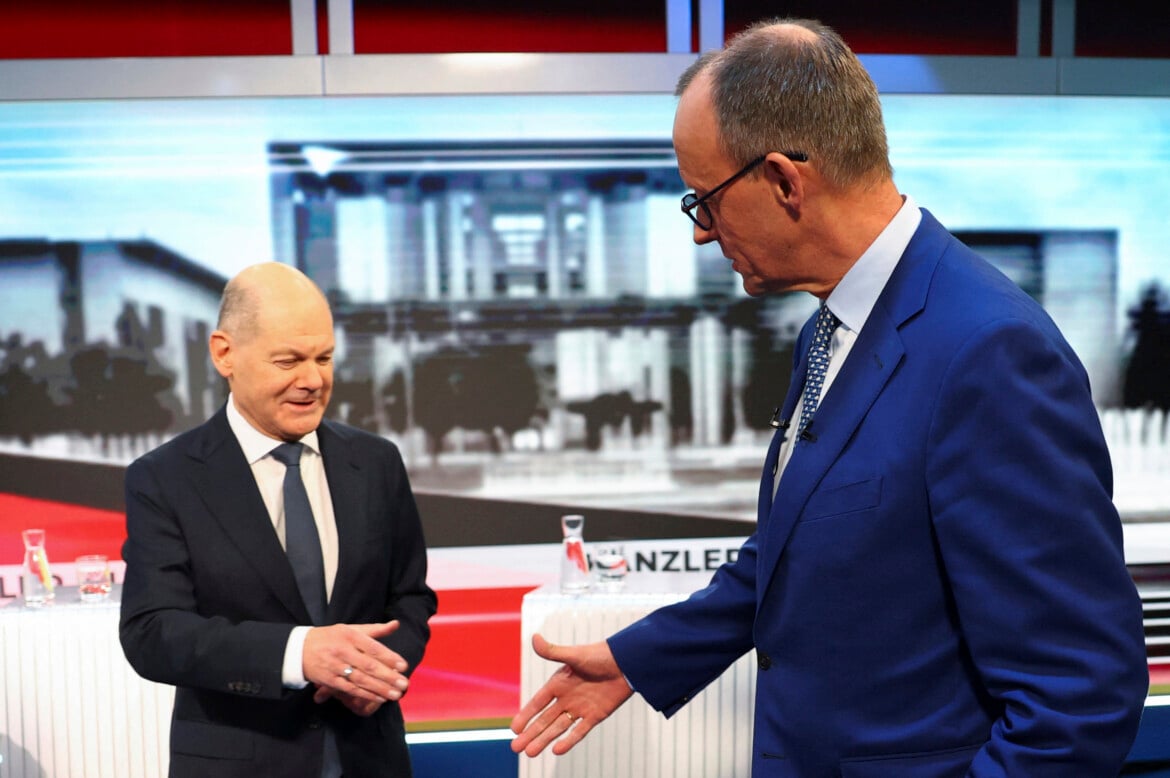Analysis
Germany ignites the European war machine, but it can afford to
Maybe someday a true “common debt” will come. But it won’t. And that means Italy will be left with the rubble of social Europe.

The engine of the new armed Europe is, as always, Germany. Two chancellors, one still in office (Olaf Sholz) and the other a shadow chancellor (Friedrich Merz), together with a former Defense Minister (Ursula von Der Leyen) installed in Brussels to lead the ragtag army of the 27 EU member states united under the banner of the arms industry lobby, have decided on a change of pace.
Among other achievements, the extraordinary European war council last Thursday decided to make the new Stability Pact more flexible – the same one they criticized only a year ago for being not inflexible enough – and to line the pockets of the arms manufacturers with €800 billion, of which €650 billion will come from the decoupling of military spending from the deficit and debt calculations and €150 billion from loans to governments with funds raised on the market by the European Commission.
The figure could increase further and the process could take longer than the four years von der Leyen announced the previous day. But for now, it all remains on paper. The political operation is what is truly relevant. Germany has asked the Commission to change the rules that set a one-year time limit on deviations from budget austerity – and thus to lengthen the exception period designed by the EU Commission to supply the missile and drone industry, including that of the U.S., while technically following its own rules.
The game is being played at two different levels: while the EU has formalized a future rearmament that for now is more of a symbolic message to Trump, in Berlin the new conservative-majority government, with the Social Democrats acting as a pro-militarist fifth wheel, are deciding on a constitutional amendment on the public debt brake to finance the German military together with a €500 billion infrastructure plan. They intend to raise military spending from 0.35% to figures above 1 percent of GDP.
This windfall of billions will give “a boost to the European economy,” said ECB President Christine Lagarde on Thursday, who has cut the cost of borrowing for the sixth time since June. That mirage was also enough to pacify the “frugal” countries orbiting Berlin, which still got the not-so-substantial reassurance that the “sustainability” of public debt will be respected. This is what Meloni is worried about the most, who on Thursday spoke of “risks” arising from the fact that “a large part of these resources have to do with debt in one way or another.” Indeed, the growth is not guaranteed – but the interest on the debt certainly is.
This is the stark reality of the power relations within the “ReArm Europe” project. Germany can afford it because it has low public debt. However, countries with massive debt like Italy have feet of clay. They can write off spending on guns and fighter jets, but they will remain bound by austerity regulations that they will still make their citizens pay for. Even with extended maturities, and low interest, they will have to pay back the money and deal with the markets. This is why Meloni has called for the funds to be allocated for defense spending that could be counted as part of NATO spending as well. There is the problem of Trump blackmailing NATO members to spend even more money. That would bleed Italy dry, as we are now talking about at least €20 billion more each year on top of this year's €32 billion.
Faced with this predicament, the Italian government has proposed a remedy that doesn’t actually solve the problem: the European Investment Guarantee, on the model of InvestEu. The goal is to maximize the use of private funds in addition to public funds. InvestEu is the old Juncker Plan, already turned into a simplified package presented by the EU Commission on Wednesday, Feb. 26. The aim of the Italian plan is to “unlock” an additional €50 billion in debt-free public and private investment. Economy Minister Giorgetti will bring it before the Economy and Finance Ministers’ meeting.
On the military use of the cohesion funds intended for the regions, Meloni said she would not use them in such a way, partly because she sensed general opposition to the scheme. According to her, such use will be “voluntary,” not “mandatory.” After all, Meloni went along with the German decision not only because she has no alternative, but because she hopes to be able to also get a waiver for spending on cybersecurity, the protection of strategic infrastructure, and research and development at the military-civilian boundary. And, who knows, maybe someday a true “common debt” will come. But it won’t. And that means we will be left with the rubble of social Europe: climate, health, research, education and income assistance, all swept away by the specter of Europe as a great power.
Originally published at https://ilmanifesto.it/il-motore-della-svolta-armata-delleuropa-resta-a-berlino on 2025-03-07
